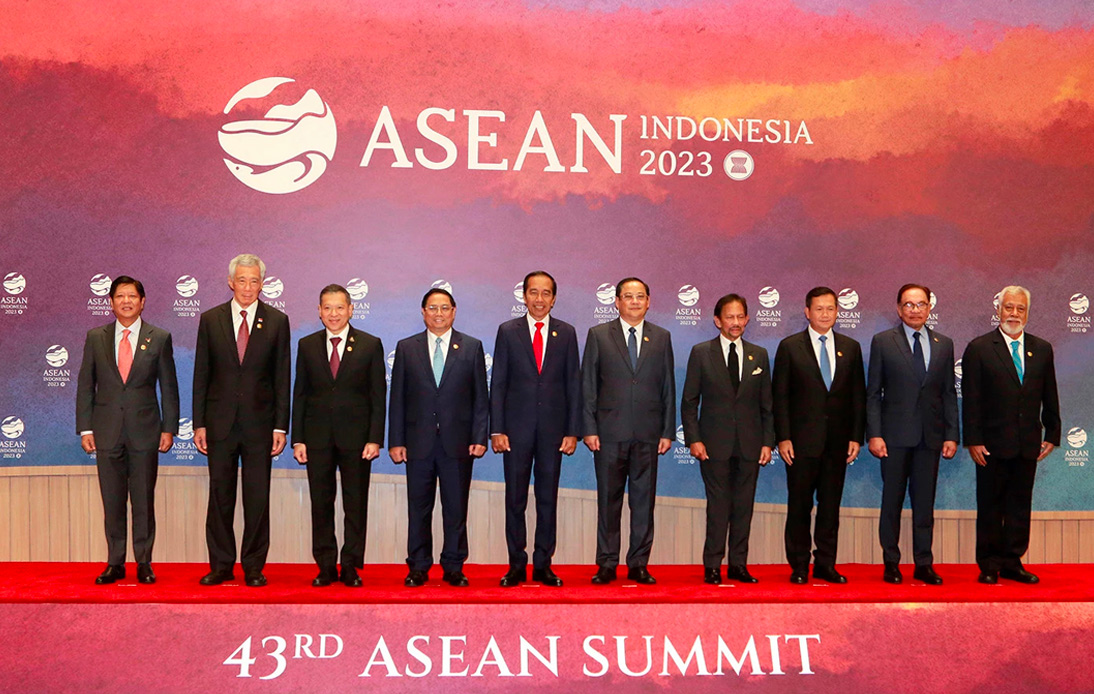
On Wednesday, Southeast Asia’s Asean members cordially invited global leaders to the capital city of Indonesia for a conference predicted to be largely consumed by concerns about the tension between the United States and China overshadowing the area.
The Association of Southeast Asian Nations (Asean), having cautioned against the risk of becoming embroiled in the conflicts of other global forces, is set to convene with US Vice President Kamala Harris, and Chinese Premier Li Qiang.
Leaders from several allied nations such as Japan, South Korea, Australia, and India will also be in attendance. Neither US President Joe Biden nor his Chinese counterpart, Xi Jinping, will be present at the summit.
High on the agenda is the Southeast Asian concert regarding China’s activities in the South China Sea, a crucial trade route where multiple member nations have coinciding territorial claims with China.
The alliance is eager to finalize a much-debated code of conduct for the waterway. The United States along with its allies have reiterated Asean’s appeals for unobstructed navigation and air travel, urging to abstain from establishing a tangible foothold in the region.
China has constructed numerous infrastructures, encompassing runways, on small islets within the contested maritime zones.
“The vice president will underscore the United States’ and Asean’s shared interest in upholding the rules-based international order, including in the South China Sea, in the face of China’s unlawful maritime claims and provocative actions,” a White House official stated on Tuesday.
Shortly before the current week’s meeting, China unveiled a map displaying its “10-dash line” marking its perceived territorial waters, seemingly extending its assertions in the South China Sea. This representation was opposed by numerous Asean participants.
Some Asean members have developed strong political, commercial, and military connections with China, whereas others exhibit greater caution. The United States has similarly pursued relationships with Asean nations, achieving differing levels of accomplishment.
Asean, in a preliminary version of an announcement slated for release this week and accessed by Reuters, indicated its intention to “fortify tranquility in the maritime domain in our region … and pursue fresh approaches towards achieving these objectives”.
Great Danger
Lina Alexandra, a political analyst at research institution CSIS, stated the preliminary document appeared “”very weak on the issues of the South China Sea”.
“This really threatens Asean’s credibility,” Alexandra expressed, pointing out that the Philippines was growing increasingly discontented with Asean’s assistance concerning the South China Sea.
“If Asean is not useful that is a great danger, because the other option is they go up to the big powers and they bring these big powers to the region.”
An individual with intimate knowledge confirmed the authenticity of the draft.
President Joko Widodo of Asean chair Indonesia cautioned on Tuesday that members should avoid being instrumentalized in the rivalry between great powers.
The discussions on Wednesday come after an exclusive Asean summit earlier this week, where leaders aimed to affirm the coalition’s significance amidst accusations of its inadequacy in urging Myanmar’s military heads to collaborate on a peace strategy in their conflict-ridden nation.
Myanmar, an Asean member, has been engulfed in conflict since the military ousted the democratically elected administration headed by Aung San Suu Kyi in the early part of 2021.
Asean has sanctioned a peace initiative, dubbed the five-point consensus, which advocates for the end of hostilities and conversations among all factions, yet the military officials have scarcely acknowledged it.
On Tuesday, Myanmar dismissed a plea from Asean urging its military forces “in particular” to moderate the ongoing crisis. Myanmar also relinquished its opportunity to preside over the consortium in 2026 to the Philippines.
The Asean alliance encompasses Brunei, Cambodia, Indonesia, Laos, Malaysia, Myanmar, Singapore, Thailand, the Philippines, and Vietnam.




















